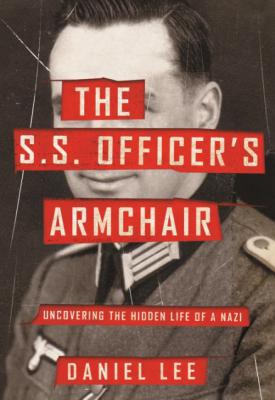The SS Officer's Armchair: Uncovering the Hidden Life of a Nazi
by Daniel Lee
New York: Hachette Books, 2020
ISBN: 978-0-316-50909-1
"The SS! SS! It nauseates me every time I read or recall these revolting abbreviations," penned Yitzchak Katznelson, a Polish-Jewish writer and educator, in his diary on August 21, 1943.
This year we mark the sixtieth anniversary of the trial of Adolf Eichmann, a high-ranking official in the Nazi SS (Schutzstaffel, Protection Squad). The SS was an elite organization within the Third Reich that was responsible for the so-called "Final Solution" and other acts of terror and destruction. With the establishment of the Reich Security Main Office (Reichssicherheitshauptampt, RSHA) in September 1939, Eichmann became head of the Jewish section of the Gestapo. At the time, Eichmann had more power than any other section chief—working under Reinhard Heydrich, and sometimes even working directly with Heinrich Himmler.
Daniel Lee's book, however, focuses on a lower-level SS official, an officer who probably would have remained unknown. The subtitle of this book, "uncovering the hidden life of a Nazi", links the jobs of both an historian and an upholsterer. One of these men recovers upholstered furniture, renewing objects of the past and the other recovers sources, presenting events of the past. In the case of this particular book, the upholsterer's discovery led in turn to the historian's discovery. Daniel Lee's book describes his quest to uncover the identity Robert Griesinger – an SS officer whose personal papers were found in the cushion of a titular chair. Ultimately, this armchair served as a vessel of Griesinger's documents for the historian Daniel Lee to construct his life.
Robert Griesinger might have been considered something of a "privileged kid": raised in Stuttgart and born into a Protestant family of social standing at the time. Tall and dashing, he was the favorite son of his doting mother. German Jews were not part of the Griesingers' social circles. While studying law at Tuebingen University, Griesinger joined a nationalistic, para-military fraternity. After he completed his doctorate, it appears that he joined the SS primarily for career advancement, though he clearly did not object to the Nazi party's ideological platform either. He worked in Gestapo headquarters in Stuttgart together with SS Franz Walter Stahlecker, who later became the commander of an SS mobile killing unit, known as Einsatzgruppe A.
Griesinger became a family man, serving the Third Reich and providing for his wife and children. He loved their pet dog, enjoyed classical music, and horse-back riding. He usually wore well-tailored suits when he was not in uniform. As an ambitious civil servant, he continuously sought promotion and advancement.
Daniel Lee, in his book, not only sheds light on the subject of his research with his readers, but also recounts how he shares traces of this information with Griesinger's family members, who know very little about their roots. Lee sensitively describes his encounters with the Griesinger family as well as others with whom he met while conducting his research that spanned over several years in seven countries.
Certainly, Robert Griesinger did not become notorious in his lifetime, let alone following his death in Prague during the aftermath of the Second World War. In essence, he disappeared into obscurity with other lower-level Nazi functionaries who were sought out and captured due to their infamous actions. "This book shows that it is possible to trace the life of one of those ordinary Nazis whose role in war and genocide seems to have vanished from the historical record. Returning texture and agency to one such perpetrator affords Griesinger the opportunity to stand in for the thousands of anonymous ordinary Nazis whose widespread culpability wreaked havoc on so many lives and whose biographies have, until now, never seen the light of day." (Page 247).
In 2016, the University College of London's Institute of Education conducted a study of some ten thousand students across England. Researchers found that more than half of the students surveyed believed that Adolf Hitler was solely accountable for carrying out the Holocaust. The majority of the students "saw the Nazis as an elite group loyal to Hitler rather than a political party that enjoyed significant, broad-based support across all sectors of the German population." Moreover, less than ten percent of the pupils surveyed in England recognized that ordinary German people were complicit in the genocide of the Jewish people.
The historical understanding of students, as well as that of the general population, is often quite shallow per this study and those undertaken in recent years by the Claims Conference. By interweaving chapters of Griesinger's background and daily life, Daniel Lee provides life-long learners an opportunity to delve into the daily life of a low-ranking SS officer and expand their knowledge. Viewers who frequent programs like "Finding Your Roots", or readers of other books such as Geraldine Schwartz's Those Who Forget, may find this book of particular interest.
Examples of culpability on all levels are crucial in a discussion about the Holocaust. This book reminds us that the Holocaust was not only carried about by Adolf Hitler and his henchmen but rather by many kinds of perpetrators on various levels – including polished individuals, with aristocratic upbringings, who studied in well-respected universities, just like Robert Griesinger.







